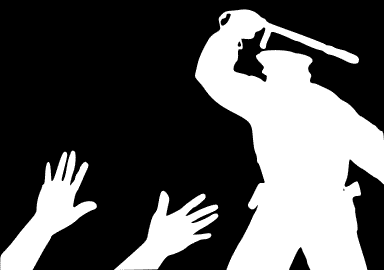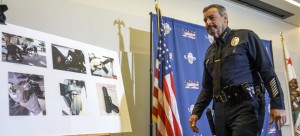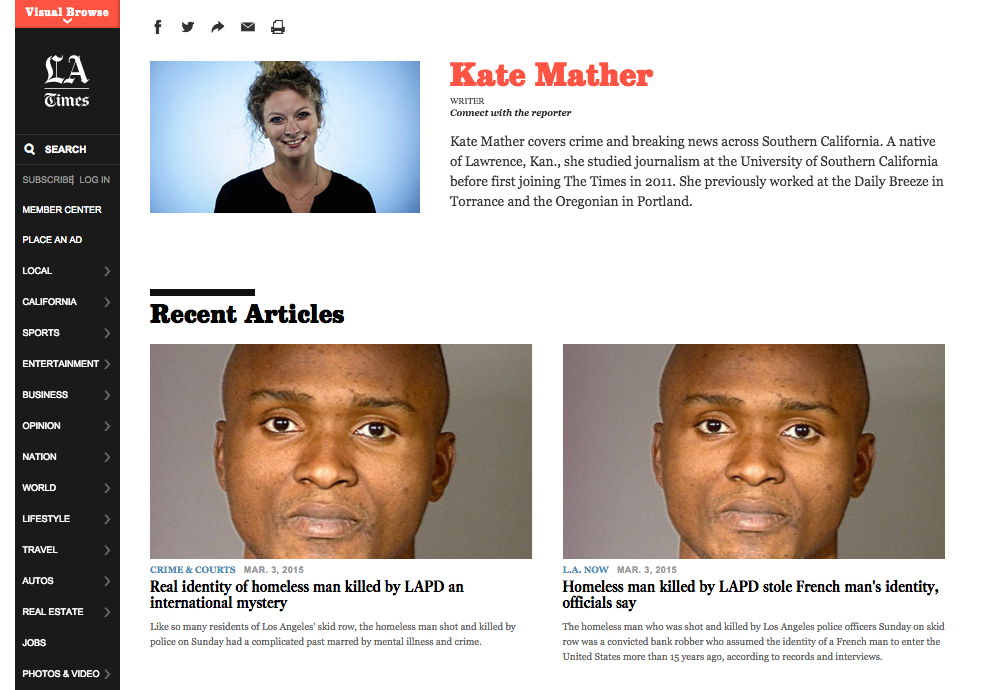LAPD, Media Rush to Judge Homeless Victim of Police Killing While Insisting Public ‘Not Rush to Judge’

A phone video of a homeless man who goes by the name Africa being shot and killed by the LAPD went viral Sunday night. The video was raw, the outrage on display from those watching the killing unfold in real time, palpable.
On cue, the LAPD and its compliant local media went into damage-control mode. Without irony, the police would insist time and time again the public not pass judgment–while they would do just that. From an initial report in LA Weekly (3/1/15):
The Los Angeles Police Protective League, which represents rank-and-file city officers, tonight urged “everyone to reserve their judgment” until investigations are completed.
In a statement the union said that audio “clearly suggests that the officers felt that they were in life-threatening danger.”
This block quote was not edited for effect, those two statements actually follow on another. Let’s take a closer look:
…urged “everyone to reserve their judgment” until investigations are completed.
…”clearly suggests that the officers felt that they were in life-threatening danger.”
From Nicholas Dahmann on Vimeo.
The LAPD police union urges people not to judge while proceeding to literallydo just that–casually asserting Africa (originally misidentified as Charley Saturmin Robinet) was at fault. In a sane universe, the obvious, glaring hypocrisy of these two statements would be challenged, or at least noted. But to a friendly local media whose default position is to simply repeat “official” accounts, no matter how illogical they may be, this type of spin goes entirely unquestioned.
This cognitive dissonance would be on display again in the LA Times initial report (3/2/15), quoting Police Commission President Steve Soboroff:
Soboroff said a key issue would be whether the man did try to grab the officer’s gun. Otherwise, he said, it’s unclear what might have prompted the use of deadly force.
“To me, that would be the only explanation that something would happen that quickly,” Soboroff said. “It escalated right in front of our eyes.”
Soboroff said the LAPD, the independent inspector general and the district attorney’s office would each investigate the shooting “very, very carefully.”
“Of course, I would encourage people not to rush to judgment. It’s not fair to anybody. It’s not fair to the family of the victim or the victim or the officers,” he said. “We’ll find out what happened.
Once again, let’s isolate these comments:
Soboroff said a key issue would be whether the man did try to grab the officer’s gun….
“To me, that would be the only explanation”
These statements are, in no uncertain terms, a judgment of the events in question.
“Of course, I would encourage people not to rush to judgment.”
But that’s what Soboroff just did. He literally just rushed to judgment. Saying that Africa reaching for an officer’s gun is “the only explanation” is, in every sense of the word, a judgment. And given Soboroff’s total lack of new or exculpatory information, entirely rushed. But again, this PR sleight-of-hand is allowed to be floated without any examination.
As a reward for its stenography, the LA Times was allowed a private screening of “enhanced” footage the police insist shows Africa reaching for an officer’s gun:
An enhanced version of a video recording of LA police officers fatally shooting a homeless man on skid row Sunday appears to show the man’s hand reaching in the direction of an officer’s waistband.
A Times review of the video shows the officer quickly pulling away at that moment. Then, three of his colleagues open fire on the man.
It was difficult to determine whether the man’s hand actually touched the officer’s weapon.
Firstly, the Times allows the goal post to move without question. The chief of police is insisting the video shows Africa reaching for the officer’s gun, but now the criteria is “reaching in the direction of an officer’s waistband”? The lead, therefore, should be “Chief Beck’s claim that Africa was reaching for the officer’s gun not supported by new video evidence.” Instead, the goal post is subtly moved to a heretofore unknown criteria of “reaching in the direction of a waistband,” as if this is somehow meaningful. Buried a few paragraphs down, the Times concedes as much:
It was difficult to determine whether the man’s hand actually touched the officer’s weapon.
Secondly, the whole premise is bizarre. The whole practice of treating the press like a clergy class who must interpret video evidence like some inscrutable ancient text, rather than just publishing it online for all to see, is inherently prejudicial. Why is the Times allowed to see this “enhanced footage” while no one else is? If the LAPD is so confident it shows he reached for a gun, then why not just release it to the public?
The boilerplate excuse about an “on-going investigation”–despite not really making any sense–would suffice to the media. And why wouldn’t it? After all, this information asymmetry works entirely to their advantage, and the LAPD knows this. Information, to them, is currency. And since the city–from the LAPD to the mayor’s office to the DA–hold all the information, it knows it can selectively leak it to paint a picture to their liking–working to the advantage of government and media alike, while leaving a grieving public totally in the dark.
This arrangement would become even sleazier yesterday when city authorities–and thus the LA Times–went into full on character assassination mode, withback-to-back smear pieces about Africa’s totally irrelevant criminal past. This screencap of the LA Times‘ Kate Mather’s bio page sums it up nicely:
Her jolly face contrasted with the scary, entirely non sequitur mugshot of Africa raises the question: Why? What does whether he robbed a bank 15 years ago have to do with anything? How is it relevant? How can it do anything but serve to posthumously try and convict him on unrelated charges of being poor and mentally ill?
But we’ve seen this before: Michael Brown was “no angel.” Eric Garner was a“career criminal.” We’ve seen before the “leaked” information about a criminal past, the one-sided framing of a person’s entire life, reducing them to someone worthy–if not deserving–of the incidental death they suffered at the hands of police.
Indeed, we know the routine by heart. Police shoot an unarmed black man and the question is not, What drove the cops to do that? What motivated the police to respond with such disproportionate force? Not, What is the criminal past of the police involved or the police department as a whole? The burden, and thus the media’s focus, is on the one person who can’t defend himself.
h/t @Olaasm, who’s been keeping the LAPD honest for years.
Adam Johnson is a freelance journalist; formerly he was a founder of the hardware startup Brightbox. You can follow him on Twitter at@adamjohnsonnyc. A version of this post appeared on his blog Citations Needed (3/4/15).



